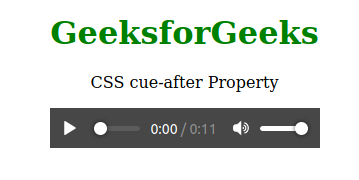CSS cue-after Property
Last Updated :
01 Oct, 2020
The CSS cue-after property is used to define an auditory icon played after the element to distinguish and set the element.
Syntax:
cue-after: url | none ;
Parameters: This property accepts two values as mentioned above and described below:
- url: This parameter holds an auditory icon resource. If a user is not able to render the mentioned auditory icon then it will produce an alternative cue, such as a bell sound.
- none: This parameter defines that no auditory icon is used.
Example 1:
HTML
<!DOCTYPE html>
<html>
<head>
<style>
.gfg {
cue-after: none;
}
</style>
</head>
<body style="text-align: center;">
<h1 style="color: green;">GeeksforGeeks</h1>
<p class="gfg">CSS cue-after Property</p>
<audio controls>
<source src=
type="audio/mp3">
</audio>
</body>
</html>
|
Output:

Example 2:
HTML
<!DOCTYPE html>
<html>
<head>
<style>
.gfg {
cue-after: url("bell.wav");
}
</style>
</head>
<body style="text-align: center;">
<h1 style="color: green;">GeeksforGeeks</h1>
<p class="gfg">CSS cue-after Property</p>
<audio controls>
<source src=
type="audio/mp3">
</audio>
</body>
</html>
|
Output:

Supported Browsers: This property is deprecated in CSS3 so the major browsers are not supported by this property
Like Article
Suggest improvement
Share your thoughts in the comments
Please Login to comment...